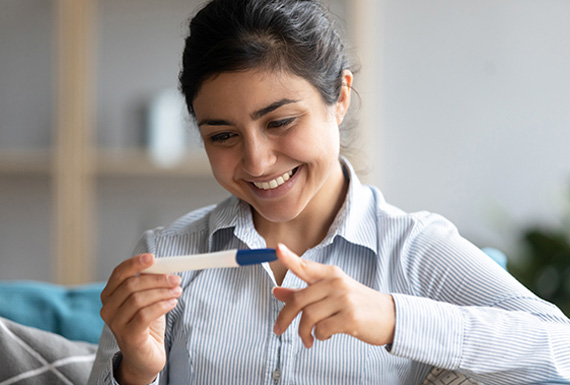Being pregnant is an experience in itself. Which is why the moment you realise you are pregnant can be the start of the most exciting period of your life.
One of the best days of testing for pregnancy is the first day of the missed period. Depending on the time of conception, you might also be able to test positive for pregnancy a week before your period due date.
If you think its too early to test for pregnancy, you can keep looking for these early signs of pregnancy:
- Visible changes in breast: Due to the change in hormone levels, the breast glands grow and prepare for milk production for breastfeeding the baby. It can result in darkened nipples, tender and larger breasts. Just make sure you give ample support to your breasts during pregnancy.
- Experience tiredness and fatigue: The rise in progesterone levels, low blood pressure and sugar levels can make you feel tired in the initial pregnancy days. It usually eases around 12-14th week of pregnancy. Make sure you eat food rich in iron and protein and take catnaps to counteract the effects.
- Nausea and Vomiting: Morning sickness is experienced in almost 70% of the cases, and it can happen in the first month of pregnancy which is why you should consider getting small meals often, avoid eating in bedtime and wear comfortable clothes. Visit your doctor and get anti-sickness medication if you have a severe cause of vomiting.
- Feel bloated and gassy: Progesterone is notorious for slowing down the passage of food through the intestine, which can increase the production of gas, resulting in more incidents of burps and passing wind. You can counter it by drinking plenty of water, increasing dietary fibre consumption and exercising. Also, avoid eating food you are sensitive.
- Food cravings or aversion to certain foods: Eating habits change, and this symptom will stop in 13th – 14th week of pregnancy drink enough water and sleep.
- Fluctuations in temperature: Increased blood volume increases the core temperature leading to women feeling hot, being sweaty, which can result in dizziness or fainting. It would help if you avoid drinking caffeine, eat small meals. You can also cool down your body with a swim, shower and lukewarm baths.
- Experience spotting and cramps: During implantation – the process in which fertilised egg attaches itself to your womb you might feel odd, experience cramps and experience spotting it is lighter than periods and will stop after two weeks of pregnancy.
- Sensitivity to smells and tastes: Hormonal changes can lead to you becoming more sensitive to smells, resulting in nausea and experiencing a metallic taste in your mouth, so make sure you steer clear of strong odours.
Other symptoms include faster heartbeats due to increased blood pressure, frequent urination, constipation, mild headaches, heartburns, mood swings and acne.
Most of the above symptoms and signs are not unique to a pregnancy and might also indicate that you are sick. If you notice these symptoms, you should take a home pregnancy test and if found positive. Make an appointment with your health care provider to confirm your pregnancy.
You need not worry if you don’t experience any of the above early pregnancy signs as the symptoms are unique to every person. Go to a doctor as soon as you realise you are pregnant so that you and your baby can receive the best care possible.

